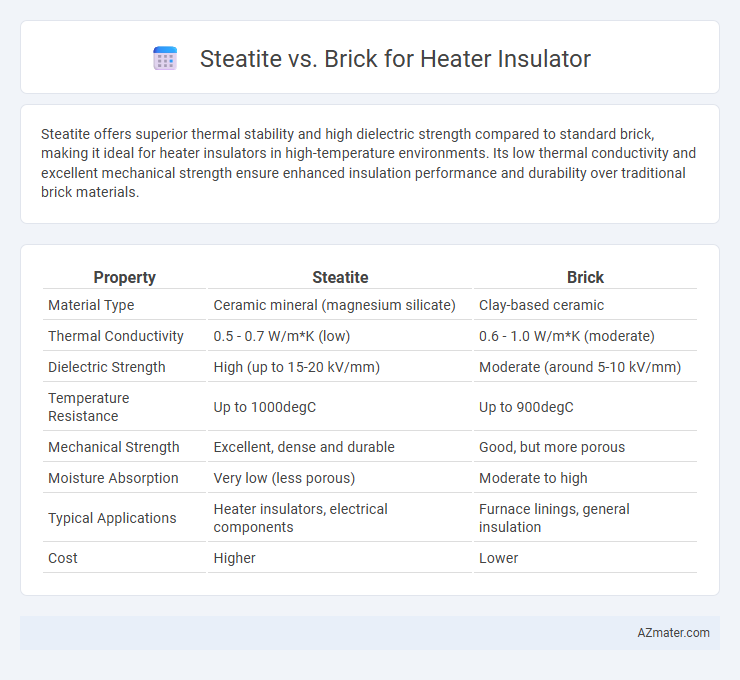Steatite offers superior thermal stability and high dielectric strength compared to standard brick, making it ideal for heater insulators in high-temperature environments. Its low thermal conductivity and excellent mechanical strength ensure enhanced insulation performance and durability over traditional brick materials.
Table of Comparison
| Property | Steatite | Brick |
|---|---|---|
| Material Type | Ceramic mineral (magnesium silicate) | Clay-based ceramic |
| Thermal Conductivity | 0.5 - 0.7 W/m*K (low) | 0.6 - 1.0 W/m*K (moderate) |
| Dielectric Strength | High (up to 15-20 kV/mm) | Moderate (around 5-10 kV/mm) |
| Temperature Resistance | Up to 1000degC | Up to 900degC |
| Mechanical Strength | Excellent, dense and durable | Good, but more porous |
| Moisture Absorption | Very low (less porous) | Moderate to high |
| Typical Applications | Heater insulators, electrical components | Furnace linings, general insulation |
| Cost | Higher | Lower |
Introduction to Heater Insulators
Heater insulators are critical components designed to prevent heat loss and ensure efficient thermal management in heating devices. Steatite, a dense ceramic material with high electrical resistance and excellent thermal stability, offers superior insulation and durability compared to traditional brick insulators. Brick insulators, commonly made from fireclay, provide cost-effective heat resistance but lack the enhanced electrical insulation and long-term mechanical strength found in steatite.
What is Steatite?
Steatite, also known as soapstone, is a dense, heat-resistant mineral composed primarily of talc and magnesium silicate, making it an excellent insulator for heater applications due to its high thermal stability and low electrical conductivity. Unlike traditional bricks, steatite offers superior thermal shock resistance and durability at elevated temperatures, ensuring efficient heat retention and prolonged lifespan in industrial heaters. Its non-porous nature prevents moisture absorption, reducing the risk of cracking or degradation under continuous heating cycles.
What is Brick?
Brick is a dense, durable ceramic material commonly used as a heater insulator due to its excellent thermal resistance and high-temperature tolerance. It provides effective heat retention and protection for heating elements, making it suitable for industrial furnaces and kilns. Unlike steatite, brick offers superior mechanical strength but typically has lower electrical insulation properties.
Material Composition: Steatite vs Brick
Steatite is primarily composed of a dense magnesium silicate mineral known for excellent thermal stability and electrical insulation properties. Traditional bricks consist mainly of clay and shale, offering moderate insulation but lower thermal shock resistance compared to steatite. The mineral composition of steatite allows it to withstand higher temperatures and provide superior durability, making it a preferred material for heater insulators.
Thermal Conductivity Comparison
Steatite exhibits a significantly lower thermal conductivity, typically around 5 W/m*K, compared to traditional bricks that range from 0.6 to 1.2 W/m*K. This difference makes steatite a superior insulator in heater applications since it effectively minimizes heat loss while maintaining structural stability under high temperatures. The high dielectric strength and mechanical resilience of steatite further enhance its performance over bricks in thermal insulation tasks.
Mechanical Strength and Durability
Steatite offers superior mechanical strength and durability compared to traditional brick when used as a heater insulator, resisting thermal shock and mechanical stress effectively. Its dense microstructure ensures longer service life under high-temperature conditions, minimizing cracking and deformation. In contrast, bricks tend to be more porous and brittle, leading to faster wear and reduced insulating efficiency.
Electrical Insulation Properties
Steatite exhibits superior electrical insulation properties compared to traditional brick due to its high dielectric strength and low electrical conductivity, making it ideal for heater insulators. Its thermal stability ensures consistent insulating performance at elevated temperatures, minimizing leakage currents and preventing electrical breakdown. Bricks, while widely used, typically have lower dielectric strength and higher porosity, which can compromise their effectiveness in high-voltage or high-temperature heating applications.
Cost and Availability
Steatite offers higher durability and superior thermal resistance compared to traditional brick, making it a cost-effective choice for heater insulation in the long term despite a higher initial price. Brick insulation materials are widely available and cheaper upfront, but they may require more frequent replacement due to lower thermal stability. Availability of steatite is limited to specialized suppliers, whereas bricks are commonly accessible in most regions.
Applications in Heater Design
Steatite offers superior thermal conductivity and electrical insulation, making it ideal for high-performance heater elements requiring precise temperature control and durability. Bricks, commonly made from refractory clay, provide excellent thermal mass and resistance to thermal shock, suitable for heavy-duty industrial furnaces and kilns. In heater design, steatite is preferred for compact, efficient electric heaters, while bricks excel in applications demanding robust heat retention and structural strength.
Which is Better: Steatite or Brick?
Steatite offers superior thermal conductivity and electrical insulation compared to traditional brick, making it a better material for heater insulators in high-temperature applications. Its low porosity and high mechanical strength enhance durability and thermal shock resistance, whereas brick tends to absorb moisture and degrade over time under repeated heating cycles. Steatite's lightweight and compact properties also improve insulation efficiency and simplify heater design, leading to enhanced performance and longevity.

Infographic: Steatite vs Brick for Heater insulator
 azmater.com
azmater.com